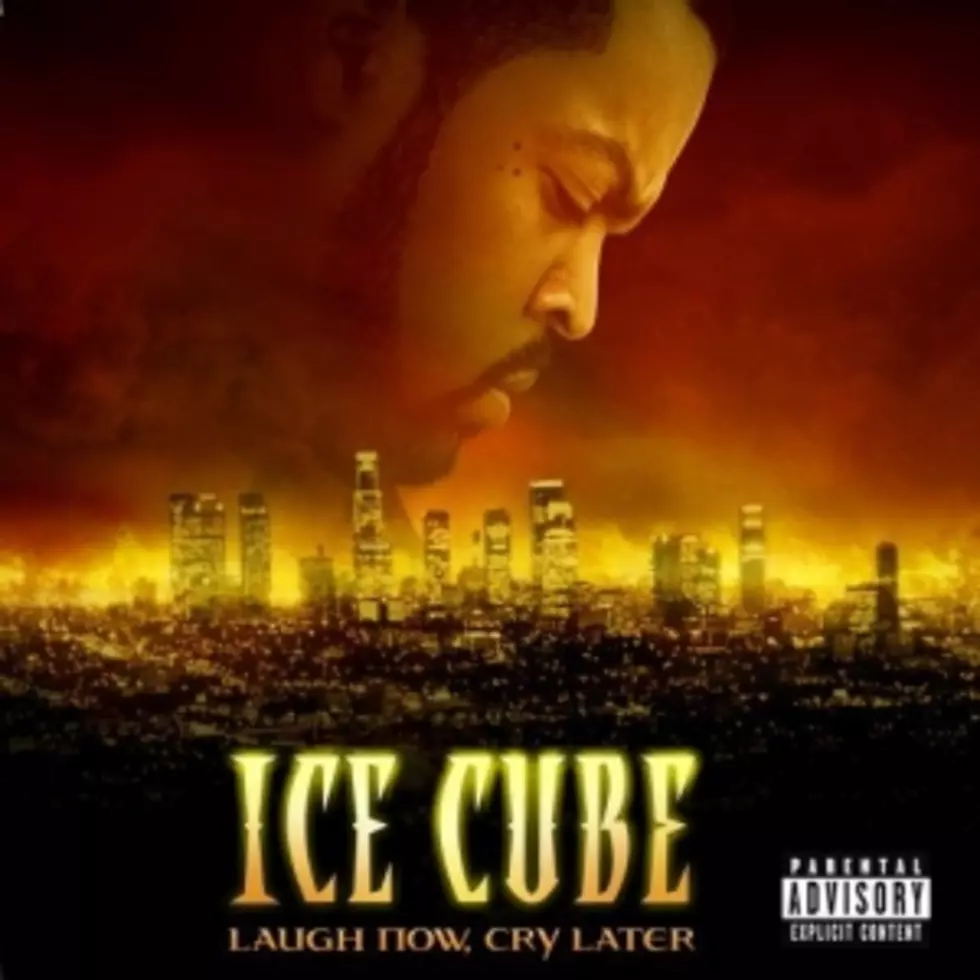
Ice Cube’s ‘Laugh Now, Cry Later’ Defied Ageism To Become His Most Overlooked Work
Being considered past your prime is a detriment, especially in hip-hop. What's hailed as the flavor of the moment can become yesterday's news faster than you can blink, and the crux of hip-hop has long been about what's fresh, hip, and new. But the further we've come as a culture, the more that we realize that keeping up with the times and nurturing youth movements may be paramount to carrying on tradition and injecting new blood into the rap music's lifeline; but there is also a need for the elder statesmen in hip-hop. These figures that can lend their experience and expertise to the younger generation; keeping themselves in the mix by thriving off of their pupils' energy. One of the artists who has stepped into this role is Ice Cube, who was once a hungry, barely-out-of-high-school rhymer himself, and became one of the more respected and revered rap artists to ever touch the mic.
After making history as the master-pen behind N.W.A.'s Straight Outta Compton, essentially helping to expose the nation to west coast gangster rap, Cube would unleash groundbreaking solo albums like AmeriKKKa's Most Wanted, Kill At Will, Death Certificate, The Predator, and Lethal Injection. All would be pegged as definitive material and required listening for rap fans, making Ice Cube one of the more critically acclaimed MCs of all-time by the mid-1990s. And his rap career provided a launchpad for a successful foray into Hollywood, with Cube appearing in memorable roles in Boyz N the Hood, Trespass, The Glass Shield, and Higher Learning before appearing in the comedy classic Friday, his first self-produced film, in 1995. Unlike fellow rappers-turned-Hollywood heavyweights like Will Smith and Queen Latifah, whose musical releases became infrequent once they hit the big screen; Cube didn't forego his hip-hop ambitions in lieu of his acting career. Instead, Cube would spend the latter half of the '90s keeping his name in the mix with album releases in 1998 (War & Peace, Vol. 1) and 2000 (War & Peace, Vol. 2) and maintaining visibility via successful, (though not necessarily acclaimed), soundtrack singles like the party-friendly "We Be Clubbin'" and "You Can Do It."
However, the new millennium would feature Ice Cube's transition into more PG-rated roles in his acting career, with films like Barbershop and Are We There Yet? showcasing the former "Nigga You Love To Hate" as a doting family man--dangerous territory for a man once credited as the creative voice of the World's Most Dangerous Group. As the aughts would trudge on, many wondered if the Ice Cube rap fans had come to respect in the '90s had been replaced by this new director, screenwriter, and - dare we say - lovable actor. But Cube, who had also delivered a Westside Connection reunion album, Terroristic Threats, in 2003; had no plans to rest on his laurels in Tinsletown. 2006 saw the release of Laugh Now, Cry Later, his seventh studio album.
Now more than 15 years removed from his solo debut, Ice Cube acknowledged the prevalence of ageism in hip-hop, but insisted that he would stick to his guns and let the chips fall where they may. "The rap generations are getting older and older," Cube said in a 2006 interview with Jet. "We even have a generation of rap pioneers in their 50s. It used to be kind of a young man's game, but you have rap fans of all ages now. So what I'm doing is catering to my fans and whoever else comes along with that, it's cool."
As for concerns that he may not be able to translate to younger fans and that a rusty performance could affect his legacy, Ice Cube scoffed at the notion, stating "You never play out. (Getting better with time) is something missing in music. All rappers should hope that my record does well just for the sake of longevity and for them to see that after 20 years in the game, you can still be be."
Released on June 6, 2006, Laugh Now, Cry Later is an album that's tailor-made for elder rap fans while still possessing enough slap and bells and whistles to appease the younger tastes of the 00s, as well. From the thunderous opening cut, "Why We Thugs," Laugh Now... gets off to an impressive start, with Cube lamenting the factors and circumstances that contribute to the violence and illegal activity prevalent in urban America.
"They give us guns and drugs/Then wonder why in the fuck we thugs/They wanna count the slugs/Then come around here and fuck with us," Cube delivers a breakdown of the lay of the land in the ghetto, as he did in a 2006 interview speaking on the inspiration behind the song. "Everybody screaming out 'I'm thug this.' 'I'm thug that,'" the rapper said in 2006. "They screaming all that, but not understanding there is a plan in place to make us the way we are and act the way we do. I just want kids and people who listen to the record to recognize that if they don't."
No-frills commentary on the state of the hood is to be expected on any release involving Ice Cube, but he throws fans an early curve-ball with the "Smoke Some Weed," which finds the O.G. waxing poetic about ganja leaf atop the Bud'da produced beat, which brings a lavish night in Bangladesh to mind. Paying homage to champion cheifers, with "Snoop Dogg, all the way to Cheech and Chong/Cypress Hill, Robert Downey hit the bong/Ricky Williams, fuck how Miami feeling/"Smoke some weed," Cube sparks things up on this enthralling offering.
"Child Support" is an open-letter to the offspring of the gangsterism he and his N.W.A. cronies helped cement in the rap game during their heyday, with Cube sounding less than pleased with what they've grown to become. Snarling "Read your test results, are you the father/I looked at his bitch ass told him don't bother/I'm the father of this gangsta shit/Never thought that I have a bunch of bastard kids," Cube makes it clear that he's a bit disappointed with the current crop of tough-talking gun-toters he inadverdently helped birth.
Declaring "I don't give a fuck about what y'all talkin about/I ain't tryin to hear none of that shit/Nigga I'mma do what I wanna do/When I wanna do it, how I wanna do it" during the onset of the album's title-track, Ice Cube comes across as a tenured player in a game where he's seen it all, gliding across production courtesy of Sean C. Known for laying down his lyricism over bombastic productions from the cream of the crop of west coast beatsmiths at his disposal, Cube heads east to link up with DJ Green Lantern, who supplies him with one of the more infectious soundbeds on Laugh Now, Cry Later, with "The Nigga Trap," which sees Cube taking the inner-city to task and urging its residents not to become victim to the low-hanging, rotted fruit planted by the powers that be.
"Growin' Up," a selection detailing the genesis of N.W.A. and the legacy they left behind, is a winner in terms of sentiment, but gets a demerit for its lackluster loop of a track, mailed-in by newcomers Laylaw & D-Mac. But Laugh Now, Cry Later redeems that slight misstep with tunes like "Chrome & Paint," a collaboration with WC that's lyrically precise and stylistically enticing. Spitting "Retire like Jigga, here comes the Attila the Hun/Killin niggas for fun, these rappers is done/The bigger they come, the harder they fall/I burn like the sun, continue to ball," Ice Cube delivers impressive bar work on this undeniable standout.
Another highlight from Ice Cube's comeback project is "Spittin' Polla Seeds," a joint drenched in west coast funk, with plenty of thump to compliment Kokane's crooning and Cube and Dub C's spittage. Running 20-tracks long, Laugh Now Cry Later is stuffed with plenty of material, some of it which weighs down the album. Tunes like "Click Clack - Get Back," produced by Emile, come off as redundant, with forced lyrics, while "You Gotta Lotta That" find place seeming out of place on the Lil Jon-produced affair and is outshined by costar Snoop Dogg. The Doggfather also makes a guest appearance on "Go To Church," another Lil Jon serviced outing that is tolerable, but pedestrian at best in comparison to the more focused fare featured on the album.
Upon its release, writer Serena Kim dubbed Laugh Now, Cry Later Cube's best release since 1993s Lethal Injection in her 2006 review of the album for Vibe, and Rolling Stone's Peter Relic hailed it as "Savage, savvy and a little bit poignant, this is a worthy addition to one of the greatest legacies in hip-hop history." But writer Tom Breihan wasn't as welcoming in his disparaging review of the album for Pitchfork, in which he noted "Everything about Laugh Now, Cry Later feels utterly tapped of inspiration and vitality, and Cube's former greatness only makes this exhausting slog that much more depressing."
Laugh Now, Cry Later is an inspired release from one of hip-hop's greatest talents, with a variety of moods and vibes that collide for favorable results. “I want to make a record that was like a history book," said Cube of the thought process behind the release. "I wanted to make a record that does what all good hip-hop does: it makes you feel good; it kind of pumps you up, but it also shows you a part of life that you might not have been paying attention to or might not even know exists."
If you're unaware of the well-rounded commentary and mature gangsterism of Laugh Now, Cry Later, you're definitely missing out on a good thing. It proved that Ice Cube could still deliver potent music in the era of D4L and Dipset; and stands as arguably the most underappreciated recording of a long and illustrious career.



